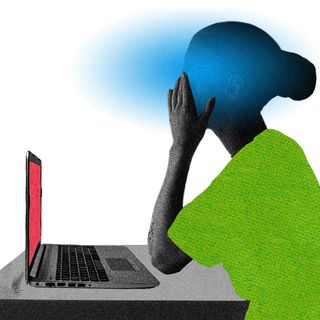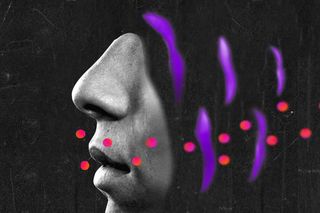
How Covid19’s ‘Less’ Harmful Symptoms Like Loss of Taste, Smell Are Continuing to Disrupt Lives Even After Recovery
Research suggests that losing the ability to smell can adversely impact social lives, personal hygiene, and even sexual satisfaction.

Amid the many life-threatening anxieties of the Covid19 pandemic, symptoms like loss of taste and smell often get promptly dismissed as trivial.
At present, experts remain unsure about the exact number of people experiencing persistent sensory dysfunction months after being infected, with one study suggesting that 96% were experiencing some form of olfactory dysfunction. While some people are struggling with anosmia (total loss of one’s sense of smell), others are dealing with parosmia, a disorder that causes people’s perception of smells to become distorted. People are even reporting “sudden, irreversible hearing loss” or tinnitus long after recovering from Covid19.
The fact that millions of people worldwide are reporting decreased ability to smell “may simply be a new public health crisis,” says Zara Patel, a rhinologist – colloquially, a nose doctor – at Stanford University.
Jyoshita, 22, who was infected in April 2020, says losing her sense of taste and smell has significantly impacted her day-to-day life by preventing her from enjoying small things that used to uplift her spirits earlier, like the smell of sandalwood. She regularly feels dejected when people around her are able to enjoy the things she can’t and worries if she’ll ever get her olfactory senses back.
“[People] tend to be distraught about the loss of sense of smell. It’s such an important part of our everyday and what makes us human…” says Aria Jafari, another rhinologist, explaining how experiences like Jyoshita’s can impact people’s mental health. “The most common thing I hear is that it leads to social isolation and feeling disconnected from the world and society as they know it.”
Research has also linked loss of smell with symptoms of depression and a reduction in one’s general quality of life. The latter, perhaps, is the result of olfactory loss impacting people’s social lives, personal hygiene, and even sexual satisfaction, as a study from 2014 notes.
Related on The Swaddle:
For Long Covid Patients, Support Groups Address the Limitations of Medicine
In some cases, the loss of smell can impact people’s careers too. Richa’s work at a fragrance company revolves around her ability to smell. The 32-year-old creates campaigns for their perfumes and is also involved in testing them during trial phases. She comes from a “family of perfumers” and talks about how some of her earliest childhood memories are of playing a scent-based game with her parents. But after contracting Covid19 in September last year, her entire olfactory palette underwent a massive change, and once-cherished smells now give her headaches. “I’ve pretty much always used scents to recreate precious moments, or set my mood for the day. And now, the smells I used to love — [even] my favorite perfume, which I wore at my wedding too — don’t appeal to me.”
Since the pandemic, Jafari has been treating a wide variety of people — including chefs and chocolatiers — whose livelihoods have been impacted like Richa’s.
Other kinds of sensory losses, too, can massively diminish people’s every day, to an extent where life doesn’t seem worth living any longer. Last March, Wayne Kent Taylor, a 65-year-old man from the U.S., died by suicide after struggling with “post-Covid-related symptoms, including severe tinnitus,” according to a statement by his family. In the wake of this news, Twitter users began sharing their own experiences of dealing with tinnitus after recovering from Covid19 — with some describing it as a “form of torture“ and others calling it “maddening and depressing.”
Fathima, 21, developed parosmia after her Covid19 infection last December, described by the British Medical Journal as “emotionally distressing.” She began to sense a foul, rotten odor every time she was around meat, and she couldn’t eat her favorite dish – chicken fry – anymore. Although she decided to convert to veganism to avoid meat, she found that she was also revolted by the smell of onions. Another inconvenience she now faces is not being able to tell whether her clothes smell foul and need to be washed.
“People with [sensory] impairment[s] are more likely to ingest spoiled food because it’s the smell, first and foremost, that warns us when something has gone off. This can increase the risk of foodborne illnesses,” wrote Johan Lundström, an associate professor at the department of clinical neuroscience in Stockholm’s Karolinska Institutet.
Related on The Swaddle:
‘Long Covid’ Patients In India Are Struggling, But Their Plight Remains Unseen
Experiences like Fathima’s can also lead to drastic changes in people’s behaviors. “The combined loss of appetite and pleasure from eating makes most people with a newly acquired smell disorder lose weight, initially. Our bodies are, however, designed to keep us alive… [So] instead of waiting until they are hungry, many will simply eat more often. These non-conscious changes in eating behavior often result in weight gain, which can lead to long-term heart problems and other related health issues,”Lundström added.
Besides not being able to tell when food has turned, losing one’s sense of smell can also endanger people’s safety. In 2021, Edelmira Rivera, then 22, from Texas, was lying in bed with her husband and 16-month-old son when a fire broke out less than a foot from her, USA Today reported. Until her sister screamed, “Fire!”, she had no idea about it. By the time she realized what was going on, it was too late to save the house from burning down.
Countless people’s lives globally have been similarly thrown into disarray because of seemingly innocuous sensory loss. Patel believes there may be a hint of a silver lining here in the attention that smell-and-taste-dysfunctions have garnered owing to Covid19. These disorders were destroying people’s lives prior to 2020 too, but the research around them was lacking in both estimating the number of affected people and avenues for disorder management.
“[I]t was the orphan, Cinderella sense… It’s only after so many millions of people have been affected or had loved ones affected that people are coming to understand the huge impacts smell and taste have on your quality of life.”
Devrupa Rakshit is an Associate Editor at The Swaddle. She is a lawyer by education, a poet by accident, a painter by shaukh, and autistic by birth. You can find her on Instagram @devruparakshit.
Related


Doctors Aren’t Warning Women of the Health Risks of Anal Sex, Leading to Complications: Report
